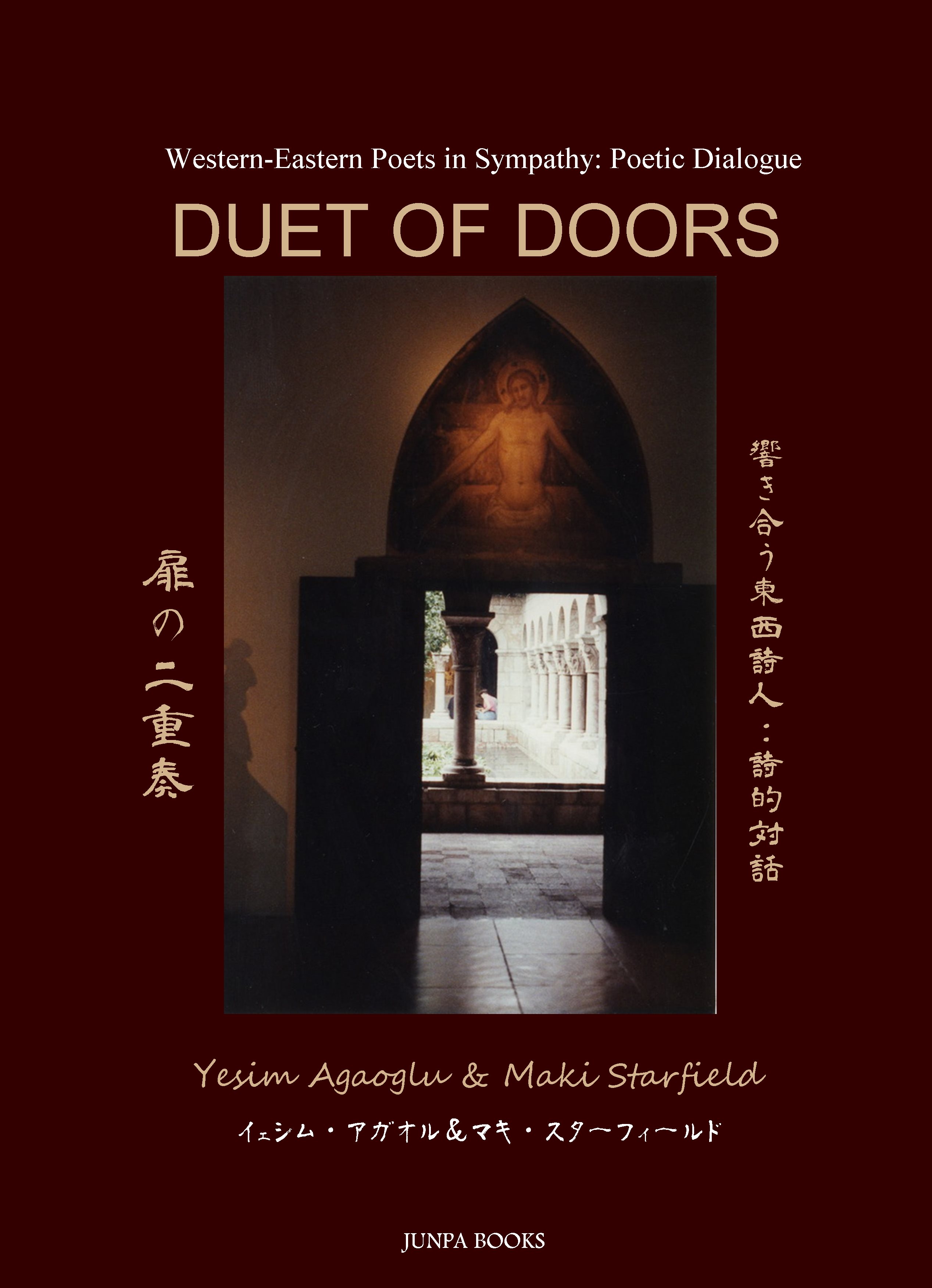
Introduction
Doorways connect us. They are the passageways in and out of our lives. Doorways frame the passage from inner to outer realities. They’re liminal spaces from where we either retreat into the privacy of our houses or reach out to the world. Open doorways welcome the interaction between home and neighborhood, artifact and nature, architecture and landscape.
In any cross-cultural project, one is always on the threshold of discovering something completely new and unexpected. So there is no better symbol for the JUMPA series of poetic dialogues which pairs Western and Eastern poets in a single volume than the offering of an open doorway through which the interchange of languages, cultures, and traditions can take place.
Yesim Agaoglu’s poetry is daring, audacious, and filled with complicated imagery. For example, in “transvestite,” she crosses traditional gender boundaries by dressing in her lover’s clothes and adopting his hairstyle: “i wrapped myself up in your clothes while you were gone / i kept opening your closet and wearing everything that’s yours / i cut my hair short like yours too /you’d think i was you if you saw me.” In “my tongue licks,” she describes the amorous journey of her roving tongue: “my tongue slithers along nocturnal streets / slides around licking nooks and corners.” At the end of the poem when her tongue has found her lover, the tongue’s final destination is described, “and at long last it’s you it licks as hard as it can / and suddenly we look and it’s already dawn.” The poem is remarkable for its uninhibited sensuality. In other poems, her juxtapositions are astonishing in such lines as, “ice blooming tulip / dervish whirling on ice;” or “her hands are octopuses / her eyes mussels;” or “on the face of a fish your face, / on the faces of flowers more then that of a laughing bird / you are a sulking child / your face everywhere . . .” Her poetry is breathless, filled with intriguing imagery: “her doors have forty different knobs / some silver, some bronze, some mother-of-pearl / her doors open on evil-eye-spells and sorcery.” Yesim Agaoglu’s photographic sequence of doorways which illustrates part of the book is an impressive collection of images. She uses each doorway to frame a smaller aspect of the landscape behind it. It seems as if she is urging the rest of us to use our imaginations to construct the spaces beyond what we can see.
The intensity of Maki Starfield’s poetry is generated by her masterful handling of imagery. Her training in haiku is evident in every line of the longer poems where her images are crisp and exact. In “a door to the future” she too employs the imagery of doors to explore the possibility of crossing over into the unknown: “I got to the door and tried to open it with all my strength. / But the door would not open. / I kept trying from morning till night. But it would still not open.” But despite all her efforts, the future remains inaccessible, mysterious, unknowable. The doorway is equally uncertain for the poet: “While waiting for the door, the poet / falls, and it isn’t certain / that the words will come . . .” Maki Starfield’s imagery is intimate and startling as in lines like “In the hottest part of my eyes / you are smiling . . .” or “I came to realize / I'm in the eye / of a typhoon” or “I want the universe / Just like a beautiful person / endlessly rising /expanding / my life.” Her haiku are clear, succinct, and evocative: “a bird migrating / now a drop of / light” or “a whistle / hanging on the neck / sunny winter day” or “core of a rose / I’ll live / positively.”
This duet of Yesim Agaoglu and Maki Starfield has produced a volume of keenly insightful poetry. Employing the imagery of the doorway, each poet invites the reader to cross over into an enigmatic realm filled with desire, delight, and discovery.
Bill Wolak
Genre: POETRY / Women AuthorsThis is one of our poetry associats in Kyoto , JUNPA to connect the western and eastern cultures,
resonating each poet's voices.
Illustration and photo pictures are by Yesim Agaogle and Bill Wolak.
paper door
When I open the door
there’s a pure white paper
On the pure white paper
nothing is written at all
This is a poet
There is no word to taste
When I pull the curtain
paper sheets are piling up one after another
Like the erection of the universe, knee deep
that paper piles up
When you close the door
there is also a pen with no name
While waiting for the door, the poet
falls, and it isn’t certain
that the words will come
But the paper
anytime
from the gaps between the poet's fingers
is watching
| Language | Status |
|---|---|
|
English
|
Already translated.
|
|
German
|
Already translated.
Translated by Susanne Ho
|
|
|
Author review: I enjoyed working with you! Thanks for your great work. |
|
Italian
|
Already translated.
Translated by CC BB
|
|
|
Author review: I enjoyed working with you! Thanks a lot. |
|
Japanese
|
Unavailable for translation.
|
|
Spanish
|
Already translated.
Translated by Jesús Aumatell Molas
|
|
|
Author review: Thank you so much for your nice translations! |